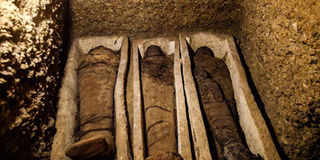Egypt unveils more than 40 ancient mummies

Some of the newly-discovered mummies wrapped in linen found in burial chambers dating to the Ptolemaic era (305-30 BC) at the necropolis of Tuna el-Gebel in Egypt's southern Minya province, about 340 kilometres south of the capital Cairo. PHOTO | MOHAMED EL-SHAHED | AFP
What you need to know:
- The remains were found laid on the floor or in open clay coffins in the crumbling chamber in Minya governorate.
- The Minya graves, discovered during an excavation that started in February last year, are in a communal tomb "probably belonging to a petty bourgeois family", the antiquities ministry said.
- The presence of mummified pets — mostly dogs — showed how important they were for the dead.
- Shards of pottery and pieces of papyrus found at the site helped researchers to determine its date, the head of Egypt's Supreme Council of Antiquities Mostafa Waziri said.
TUNAH AL-GABAL,
They are more than 2,000 years old but remain in "good condition": Egypt on Saturday unveiled over 40 mummies dating back to the Ptolemaic era at a burial site in the centre of the country.
Journalists clambered down a ladder and through an underground chamber beneath the sandy soil of Tunah Al-Gabal, 260 kilometres (160 miles) south of Cairo, to glimpse the recent finds.
Archaeologist Rami Rasmi told AFP that 12 children and six animals were among the more than 40 mummies, while the rest were adult men and women.
The remains were found laid on the floor or in open clay coffins in the crumbling chamber in Minya governorate.
While mummification is mostly associated with ancient Egypt, the practice continued under the kingdom founded by Ptolemy, a successor to Alexander the Great, which lasted from 323 BC to 30 BC.
The Minya graves, discovered during an excavation that started in February last year, are in a communal tomb "probably belonging to a petty bourgeois family", the antiquities ministry said.
Archaeologist Mohamed Ragab said two tombs were discovered nine metres underground and contained more than six rooms.
The presence of mummified pets — mostly dogs — showed how important they were for the dead.
"These animals were so dear to their owners that they buried them... in their tomb," Ragab said.
Shards of pottery and pieces of papyrus found at the site helped researchers to determine its date, the head of Egypt's Supreme Council of Antiquities Mostafa Waziri said.
Ancient Greek rulers reached the height of their power between the conquests of Alexander the Great and the rise of the Roman empire.





